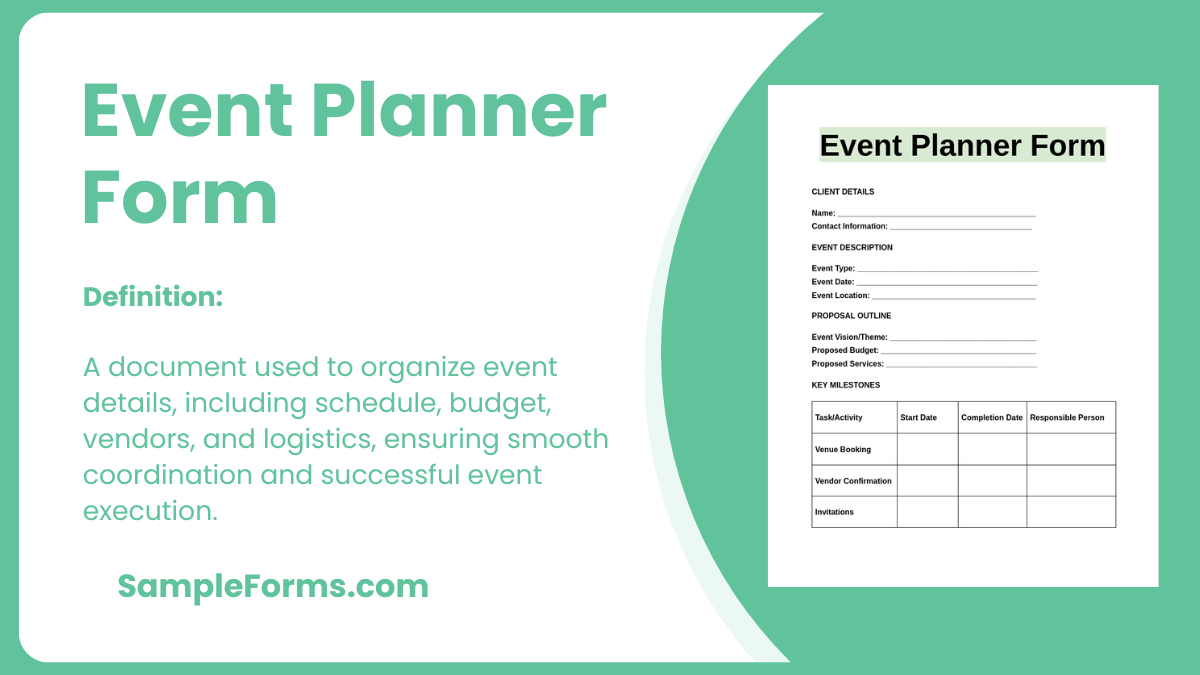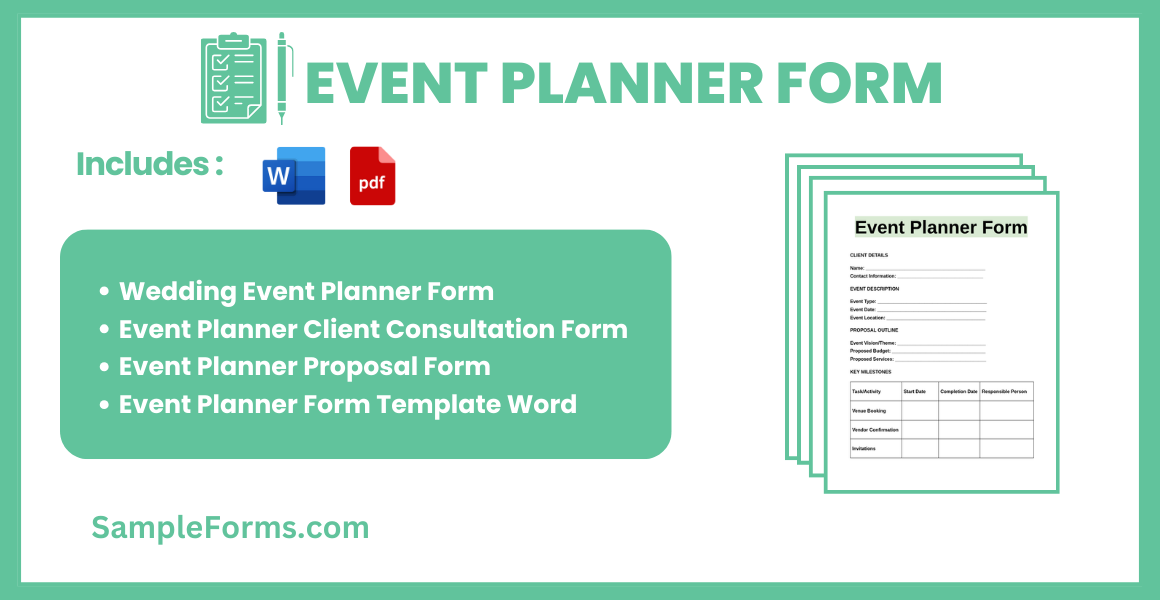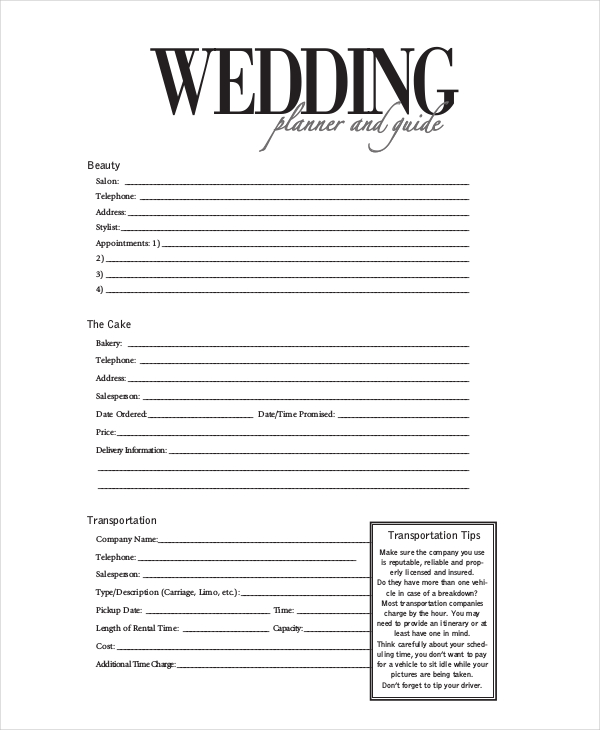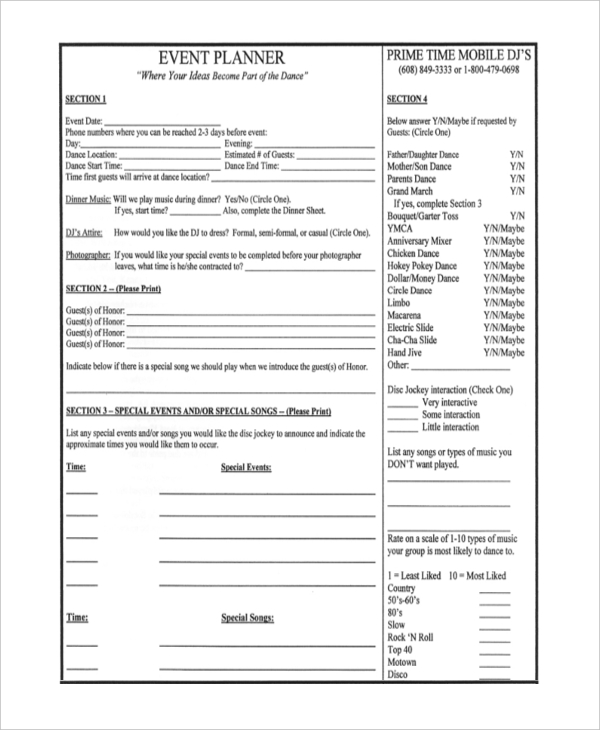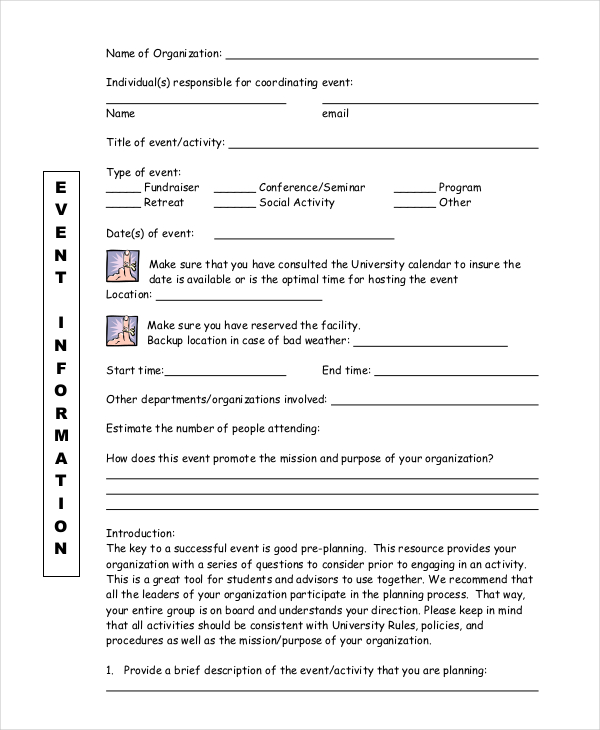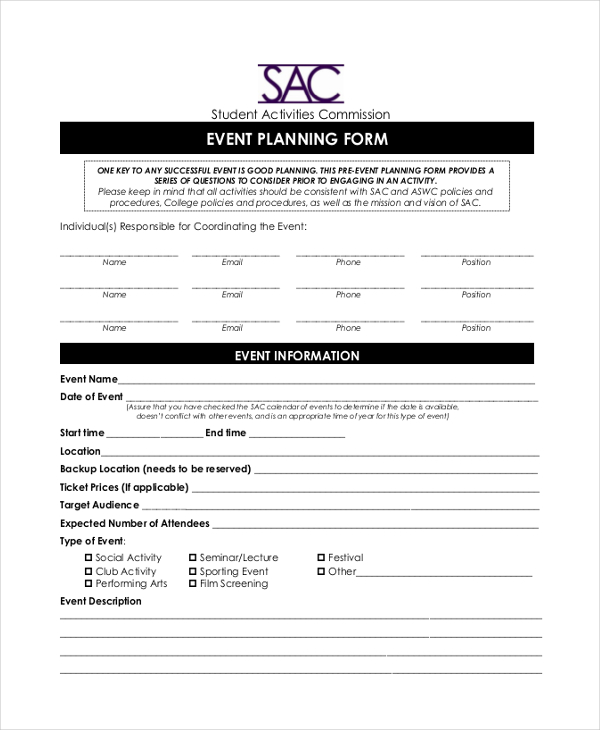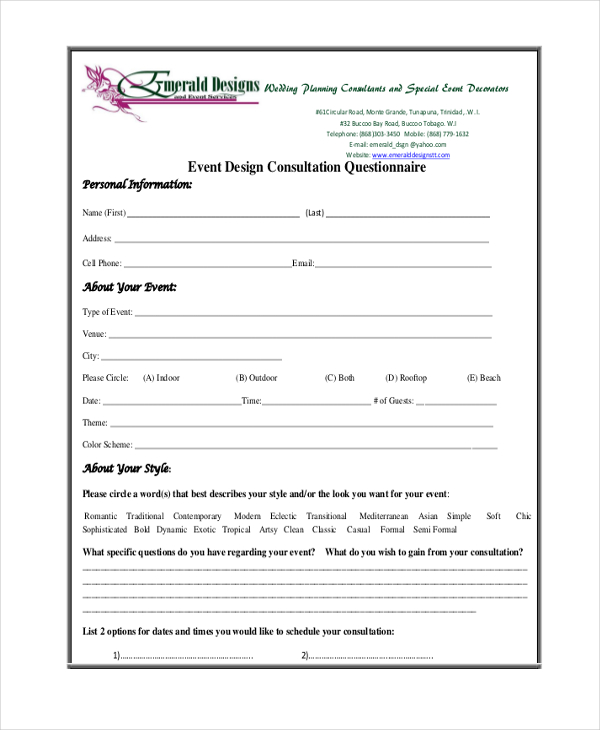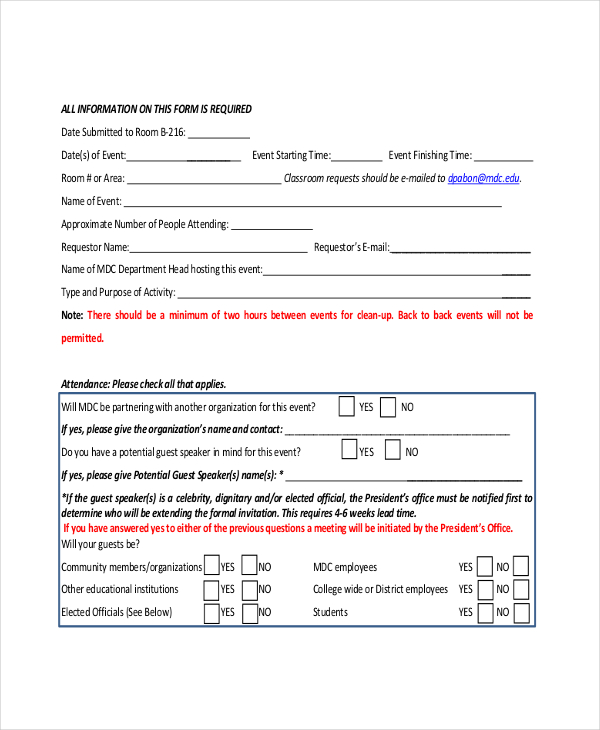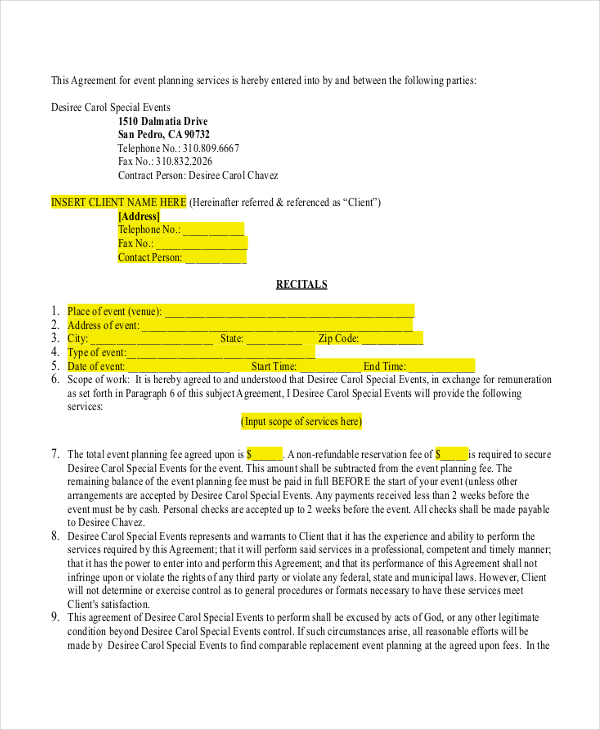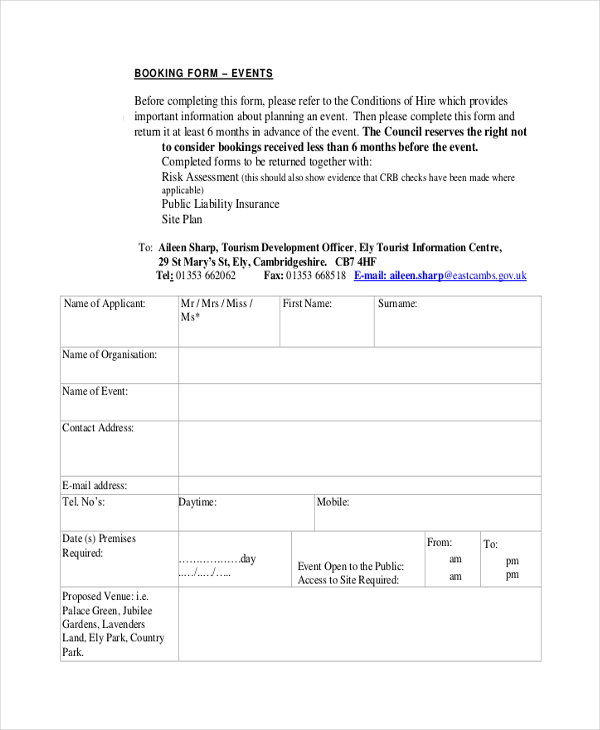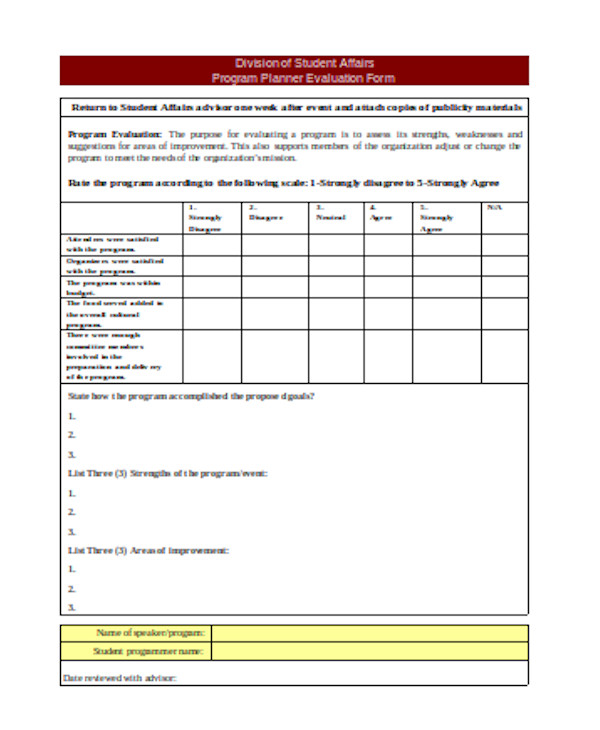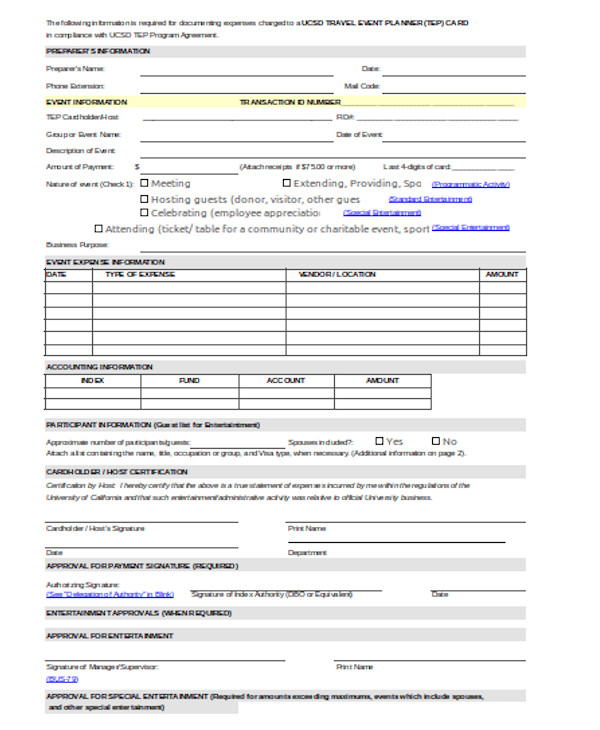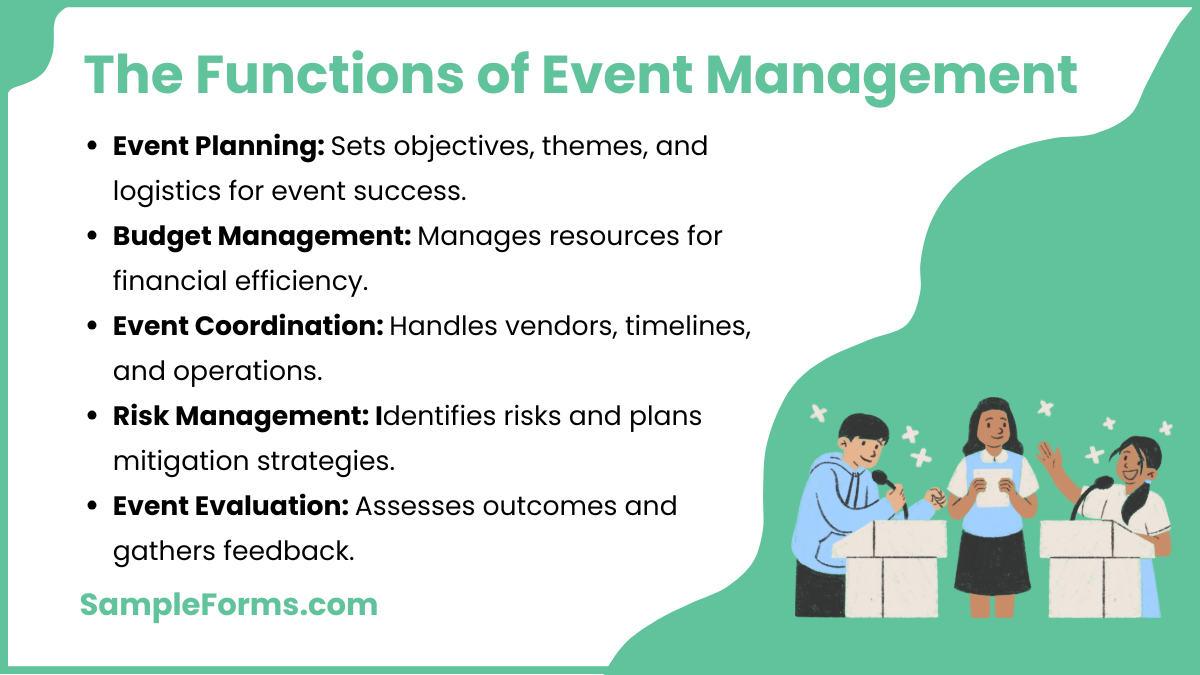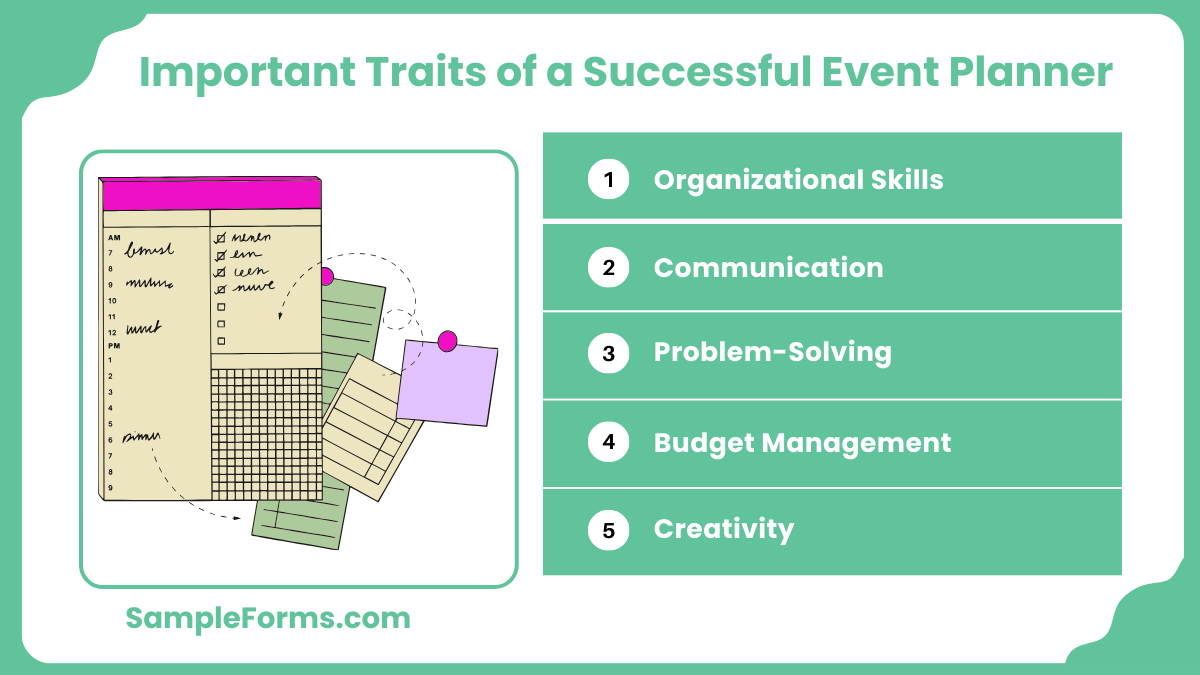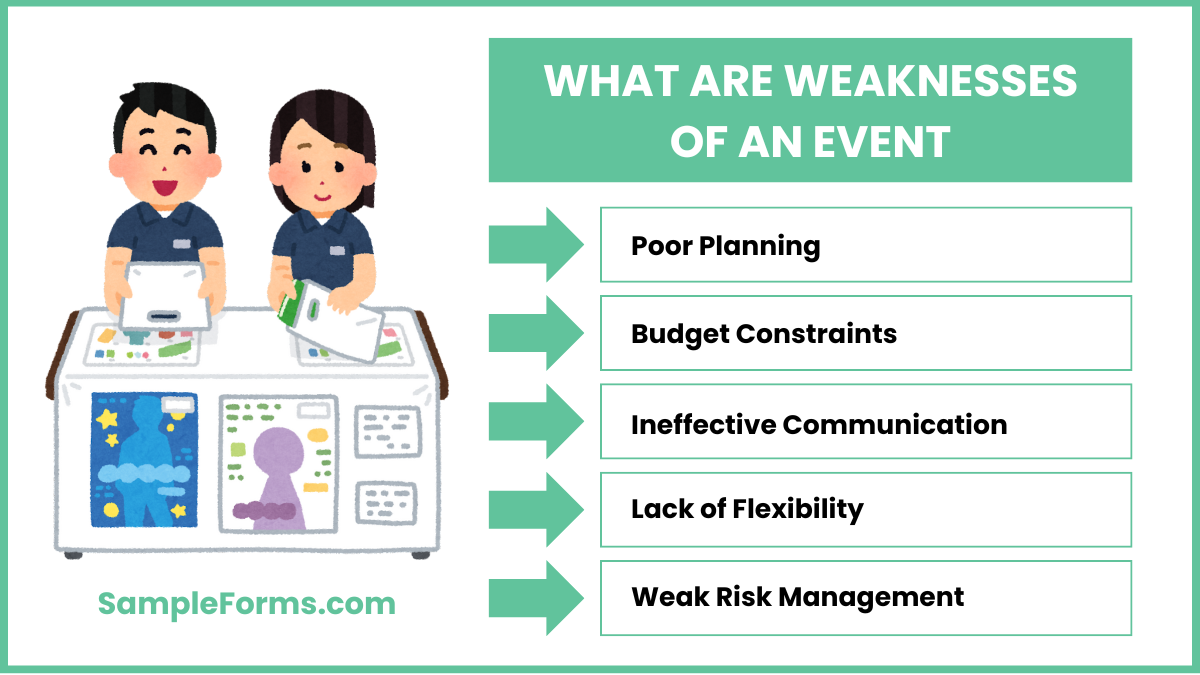Organizing an event requires meticulous planning and attention to detail, which is where an Event Planner Form becomes invaluable. This form acts as a centralized document that captures all crucial event details, including schedules, vendor information, budget estimates, and guest lists. Whether you’re planning a corporate meeting, wedding, or community gathering, using an Event Form ensures nothing falls through the cracks. It helps streamline communication among team members, reduces errors, and improves overall event management. In this guide, we will explore different examples and templates of Event Planner Forms to help you plan successful events effortlessly.
Download Event Planner Form Bundle
What is Event Planner Form?
An Event Planner Form is a structured document used to collect and organize essential details for event planning. It helps event organizers manage key components such as schedules, vendor contacts, budgets, and guest information. This form ensures that all aspects of the event are covered, improving efficiency and reducing the likelihood of overlooking important tasks. Event planners rely on it to streamline operations and ensure a well-coordinated event.
Event Planner Format
Event Details
Event Name: ____________________________
Date: ____________________________
Time: ____________________________
Venue: ____________________________
Event Type (Conference, Wedding, etc.): ____________________________
Organizer Information
Organizer Name: ____________________________
Contact Number: ____________________________
Email Address: ____________________________
Company/Organization (if applicable): ____________________________
Event Objectives
Purpose of the Event: ____________________________
Key Goals: ____________________________
Target Audience: ____________________________
Budget Planning
Estimated Budget: ____________________________
Allocated for Venue: ____________________________
Allocated for Catering: ____________________________
Marketing/Promotion Budget: ____________________________
Vendor Details
Vendor Name: ____________________________
Service Provided: ____________________________
Contact Information: ____________________________
Event Schedule
Start Time: ____________________________
Activity/Program: ____________________________
End Time: ____________________________
Additional Notes
Special Requirements: ____________________________
Other Information: ____________________________
Wedding Event Planner Form
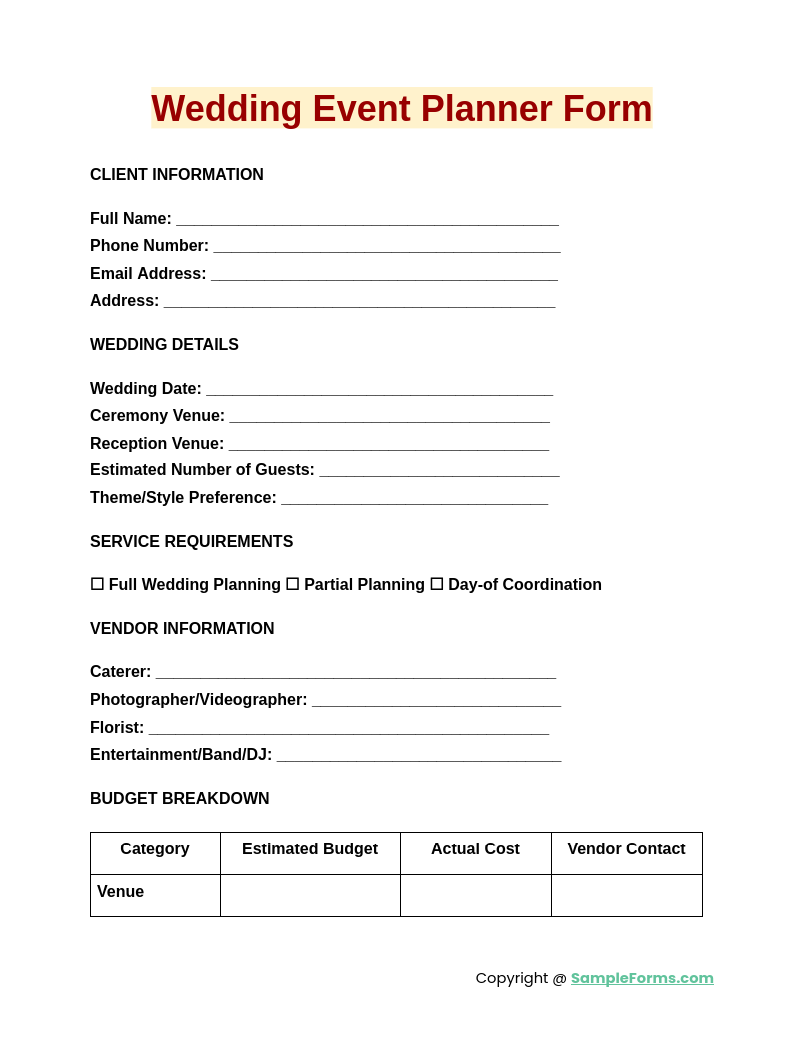
A Wedding Event Planner Form helps organize every wedding detail, from venue selection to guest lists. Similar to an Adverse Event Form, it ensures nothing is overlooked, streamlining the planning process for a stress-free, memorable celebration.
Event Planner Client Consultation Form
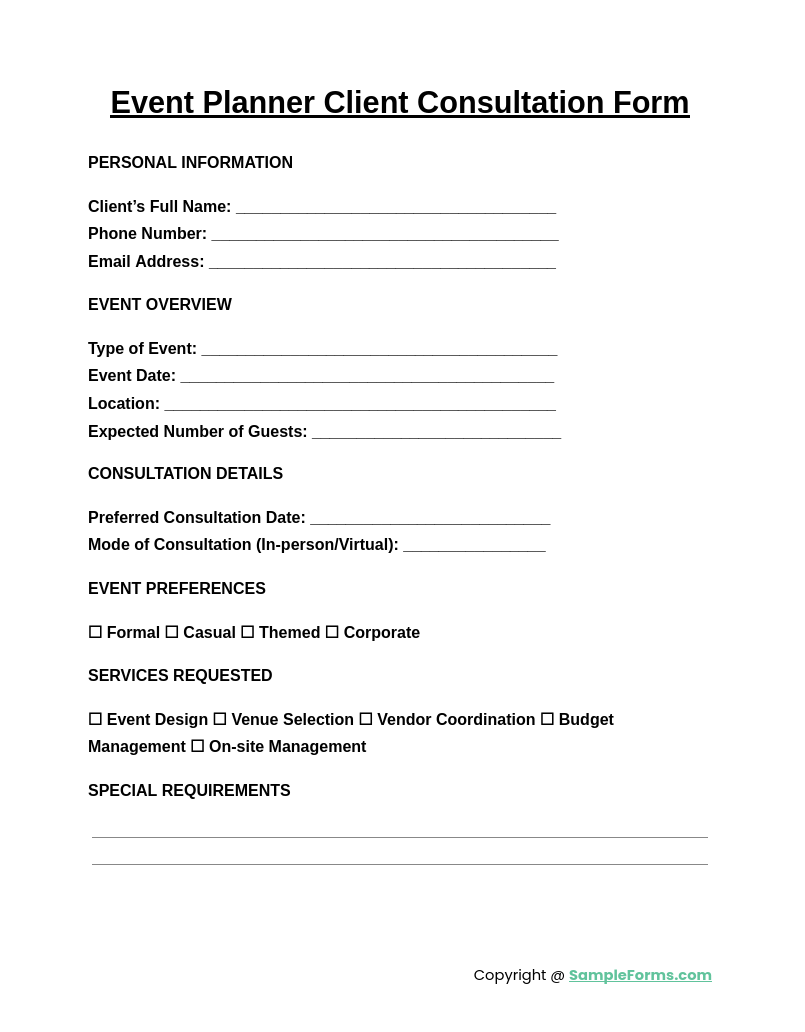
An Event Planner Client Consultation Form gathers essential client details, preferences, and event goals. Like an Event Sponsorship Proposal, it helps understand specific needs, allowing planners to tailor event services for successful and personalized experiences.
Event Planner Proposal Form
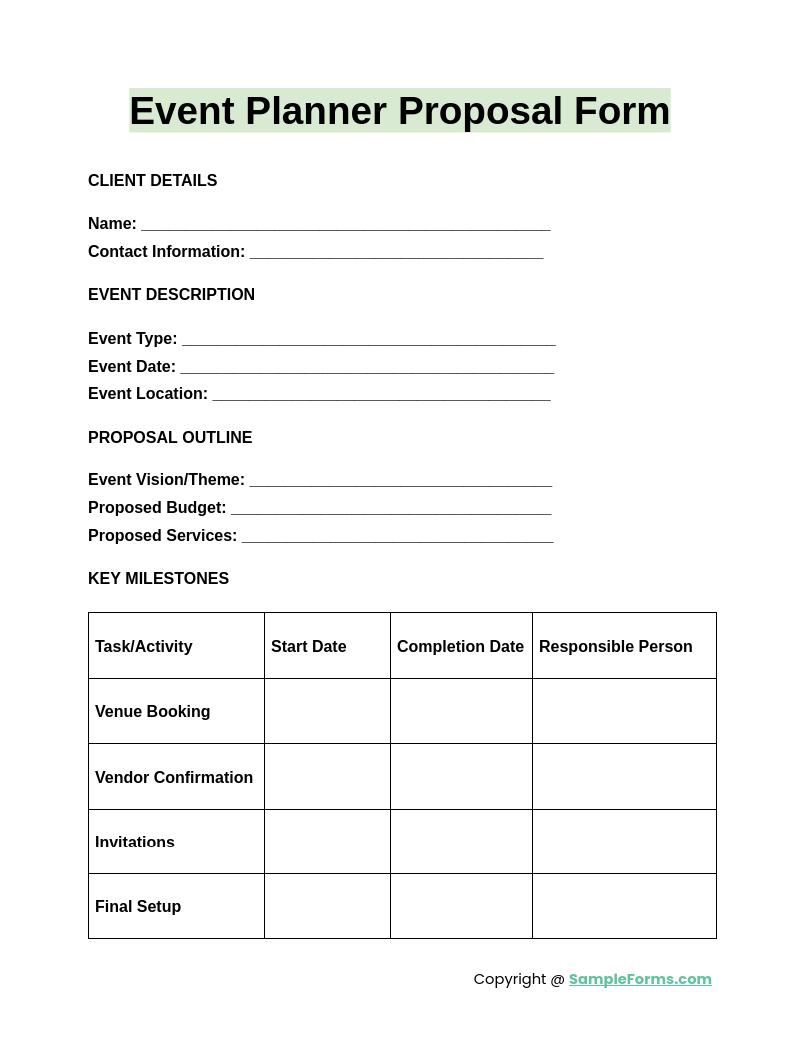
An Event Planner Proposal Form outlines event objectives, services offered, and budget estimates. Similar to an Event Registration Form, it ensures clear communication between planners and clients, defining expectations and securing client approval efficiently.
Event Planner Form Template Word
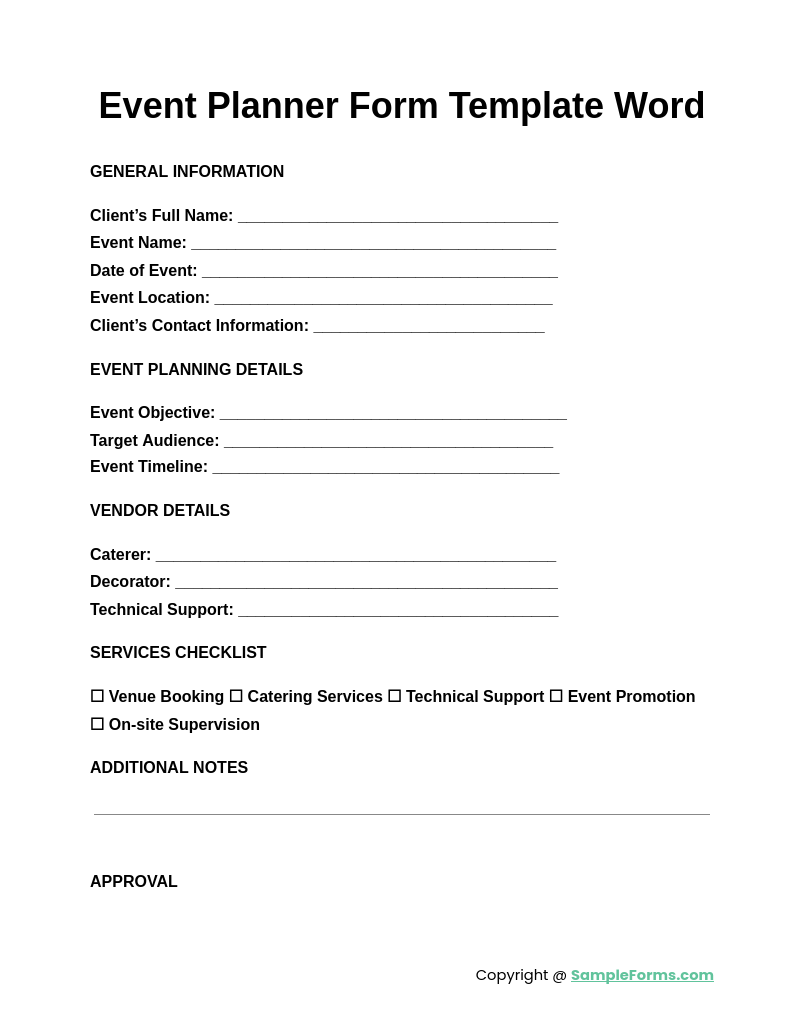
An Event Planner Form Template Word simplifies event organization with editable sections for schedules, contacts, and logistics. Just like an Event Order Form, it provides a structured format, making event planning seamless, efficient, and easy to customize.
Browse More Event Planner Forms
Sample Wedding Event Planner Form
DJ Event Planner Form
Sample Pre Event Planner Form
Event Planner Evaluation Form
Event Planner Consultation Form
Sample Event Planner Request Form
Event Planner Contract Form
Event Planner Booking Form
Event Planner Evaluation Form
Travel Event Planner Form
What are the Functions of Event Management?
The six functions of event management ensure seamless event execution, covering planning, organizing, and evaluating. Key functions include:
- Event Planning: Defines objectives, themes, and logistics to set a solid foundation for event success.
- Budget Management: Allocates resources effectively, similar to an Event Budget Form, ensuring financial efficiency.
- Event Coordination: Oversees vendor management, timelines, and on-site operations for smooth event flow.
- Risk Management: Identifies potential risks, creating strategies to mitigate issues before and during the event.
- Event Evaluation: Uses tools to assess outcomes and gather feedback for future improvements.
What are the Important Traits of a Successful Event Planner?
Successful event planners possess traits that ensure efficient event management and execution. Key traits include:
- Organizational Skills: Ability to manage multiple tasks, timelines, and details without missing critical components.
- Communication: Strong verbal and written skills to interact with clients, vendors, and teams effectively.
- Problem-Solving: Quick thinking and adaptability to handle unexpected issues smoothly during events.
- Budget Management: Efficient handling of finances, similar to managing an Event Booking budget for cost control.
- Creativity: Innovative thinking to design engaging and memorable event experiences.
How Do You Plan an Event Step-by-Step?
Planning an event involves systematic steps to ensure all aspects are covered for a successful outcome. Key steps include:
- Define Event Goals: Identify the purpose, objectives, and desired outcomes of the event.
- Create a Budget: Develop a comprehensive budget, covering all expenses.
- Choose a Venue: Select an appropriate location that aligns with event requirements and audience size.
- Develop a Schedule: Outline timelines for activities, setup, and coordination tasks.
- Gather Feedback: Post-event, collect responses using an Event Feedback Form for evaluation and improvement.
What are the Elements of an Event Organizer?
The seven elements of an event organizer help in executing well-structured, successful events. Key elements include:
- Objective Setting: Clearly define event goals and desired outcomes to guide planning.
- Budget Management: Allocate financial resources effectively.
- Logistics Planning: Manage venue arrangements, transportation, and technical requirements.
- Vendor Coordination: Liaise with suppliers, caterers, and service providers to ensure smooth operations.
- Marketing & Promotion: Strategically promote the event to reach the target audience.
- Risk Assessment: Identify potential risks and develop contingency plans.
- Evaluation: Conduct post-event analysis using tools like an Event Evaluation Form to assess success.
What Are Some Weaknesses of an Event?
Event weaknesses refer to challenges that can impact the event’s success. Common weaknesses include:
- Poor Planning: Inadequate preparation leads to disorganized event execution.
- Budget Constraints: Limited finances, without proper management using an Event Waiver Form, can restrict event quality.
- Ineffective Communication: Miscommunication with vendors, clients, or team members causing delays and confusion.
- Lack of Flexibility: Inability to adapt to unexpected changes or issues during the event.
- Weak Risk Management: Failure to anticipate potential problems, resulting in unaddressed emergencies during the event.
How to Organize an Event?
Organize an event by defining objectives, setting a budget, securing a venue, coordinating with vendors, and using an Event Contract Form to formalize agreements for smooth execution.
How Many Checklist Items Can You Have in Planner?
A planner can include unlimited checklist items, covering tasks like logistics, scheduling, and vendor coordination, ensuring nothing is missed, especially when managing an Event Sponsorship Form for partnerships.
Can You Add Documents to Planner?
Yes, you can add documents to a planner for easy access to critical files like the Event Survey Form, contracts, or schedules, enhancing event organization and management.
How Do You Structure a Planner?
Structure a planner by outlining goals, creating timelines, assigning tasks, and incorporating essential documents like an Event Inquiry Form for efficient event tracking and coordination.
Which Planner Layout is Best?
The best planner layout depends on event needs, but a layout with daily, weekly, and task-focused sections works effectively, especially when managing an Event Agreement Form.
What Should an Event Plan Look Like?
An event plan should outline objectives, schedules, budgets, and key contacts, including necessary documents like an Event Request Form to streamline the planning process.
How to Make an Event Planning Document?
Create an event planning document with sections for goals, timelines, vendors, and budgets. Incorporate a Vendor Event Form to manage supplier details efficiently.
How to Stand Out as an Event Planner?
Stand out as an event planner with creativity, strong organizational skills, and attention to detail. Providing clear documentation, like an Event Receipt Form, boosts professionalism.
What Makes a Good Planner?
A good planner includes clear objectives, organized timelines, task assignments, and essential approvals, like an Event Approval Form, to ensure smooth event management.
How to Plan an Event Checklist?
Plan an event checklist by listing tasks such as budgeting, venue booking, vendor coordination, and adding an Event Vendor Registration Form to manage supplier details effectively.
In conclusion, using an Event Planner Form is crucial for organizing successful events. It helps manage tasks efficiently, keep track of details, and coordinate with vendors and participants. Whether you’re planning a small meeting or a large conference, the right form can simplify your workflow. Explore various templates, samples, and formats to find what best fits your needs. An Event Planning Intake Form is an excellent starting point to ensure all critical details are captured, leading to well-executed, memorable events.
